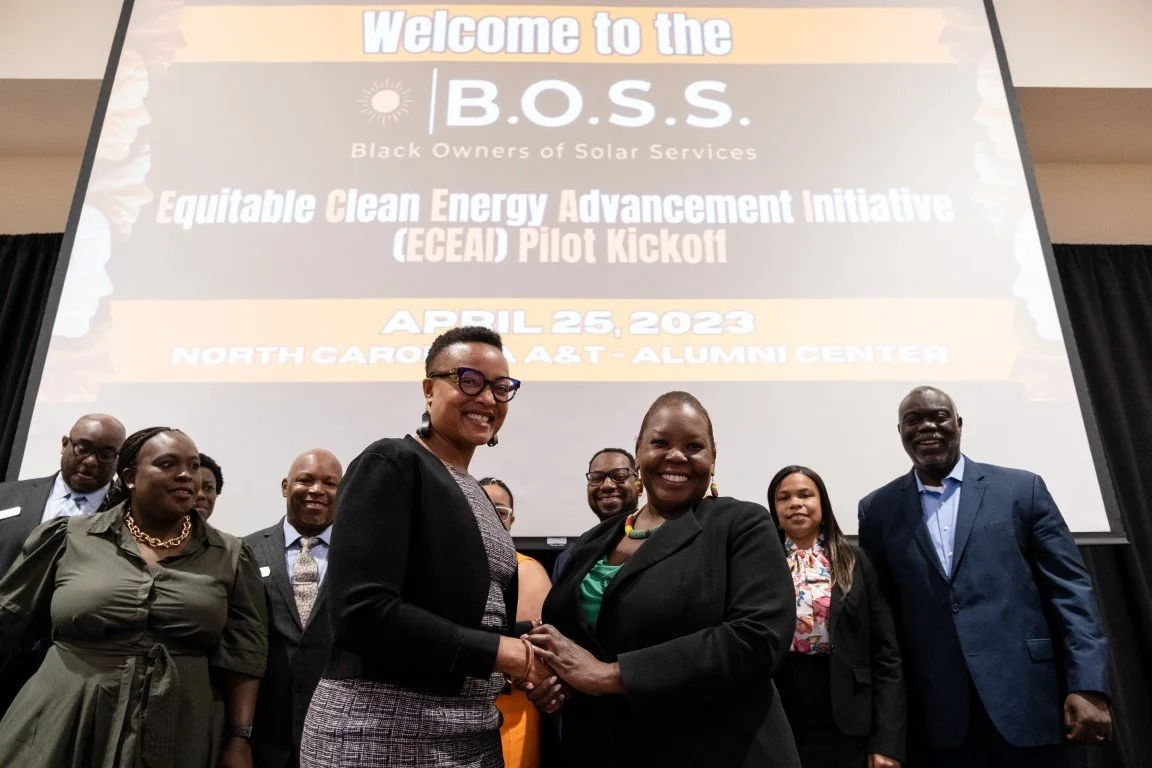Celebrating Early IRA Wins
When the Inflation Reduction Act (IRA) was signed a year ago, we celebrated the incredible opportunity to direct billions of taxpayer dollars toward community-driven climate solutions. At the same time, we recognized the huge amount of work it would take to disrupt historical patterns and ensure these funds reach Black, Brown, Indigenous, and low-wealth communities that have been systematically left behind.
Looking back, we’re in awe of how much has been accomplished by grantee partners — in shaping program design, getting their communities ready to access funding, beginning to move projects from shovel worthy to shovel ready, and re-doubling efforts to stop oil and gas expansion that’s also being subsidized by the IRA.
Scaling Community-Driven Climate Solutions
Putting the federal funding puzzle pieces together is incredibly complex, but we know that strong, equity-centered financial infrastructure and bolstered community capacity are key to the IRA’s success in bringing community-led climate solutions to scale and building long-term public support for more climate action.
Strengthening Equitable Green Finance Infrastructure
The African American Alliance of CDFI CEOs, the National Bankers Association, Inclusiv, and other BIPOC-led organizations successfully advocated for the EPA to collaborate with multiple partners in channeling grant and loan funds through the Greenhouse Gas Reduction Fund (GGRF) increasing the chances of these resources reaching institutions with a track record of serving low-income communities, in line with Justice40 objectives.
Through the 19-member Community Builders of Color Coalition, these organizations also established the Justice Climate Fund to move GGRF and other funds towards clean energy initiatives and offer technical assistance to communities of color. They are now gearing up to apply to serve as an EPA designated lending hub.
The Clean Energy Fund of Texas was awarded $2 million in private capital to pilot new lending products for energy efficiency upgrades in low-income communities of color. They also launched an electric vehicle line of credit pilot program in partnership with the City of Austin aimed at increasing access to electric vehicles for low- and moderate-income families.
Building Community Capacity
Ajulo Othow (right), Executive Director of EnerWealth Solutions, with Department of Energy Director Shalanda Baker at the B.O.S.S. launch event. Photo by Cornell Watson.
Deep South Center for Environmental Justice was selected as an EPA Thriving Communities Technical Assistance Center to help remove barriers to federal funding.
Partnership for Southern Equity’s Justice40 Accelerator has supported over 100 groups nationally in seeking federal funding for renewable energy and energy efficiency projects and other climate and environmental justice initiatives, with an 81 percent success rate.
Anchored by grantee partner EnerWealth Solutions, Black Owners of Solar Services (B.O.S.S.) won $6M in Department of Energy funds to pilot a program that will serve as a national model for supporting minority-owned businesses and entrepreneurs in entering the clean energy industry.
Early Clean Energy Project Successes
West Street Recovery Co-Director Doris Brown's solarized home is serving as a neighborhood resiliency hub. Photo courtesy of Solar United Neighbors.
Georgia Conservation Voters Education Fund and other climate justice groups organized together across the state to educate and support school districts in applying for the EPA’s Clean School Bus program, resulting in awards of 122 buses, including charging infrastructure, across 14 districts.
Roanoke Cooperative, a North Carolina rural electric cooperative with a nonprofit arm Roanoke Center, piloted an electric vehicle-to-grid model in partnership with Clean Energy Works that they are now implementing with local school districts, and are using federal funds to upgrade power lines, paving the way for more rooftop solar and other renewables.
Air Alliance Houston partnered with the City of Houston to win $500,000 from the EPA for air monitors to track air quality and identify toxic hotspots, giving advocates extra ammunition for transitioning away from polluting industries.
Solar United Neighbors partnered with West Street Recovery in Northeast Houston to install solar on 10 homes, including three with battery systems, creating finance and installation models ready to scale.
Holding the Line on Dirty Energy
The much-needed emission reductions from IRA implementation could be canceled out and then some by expanding oil, gas, and petrochemical industries. The IRA incentivizes these industries to grow through carbon capture and sequestration (CCS) subsidies, among other provisions. CCS is a risky and unproven process that is used primarily to push more fossil fuels out of the ground. We know that meeting our national climate targets means stopping new oil and gas drilling and exports, as well as harmful biofuel projects.
Commission Shift and other Texas groups used organizing and education to stop proposed legislation declaring that CO2 is not a pollutant or a nuisance, which would have limited the ability of regulators to prevent leaks and venting on CCS facilities, as well as the public’s ability to file claims related to injuries.
The Louisiana Against False Solutions coalition is challenging Louisiana’s application to the EPA for primacy in regulating CO2 injection wells. LAFS recently turned out hundreds of people to testify and submitted more than 19,000 comments at a recent EPA hearing.
The Environmental Justice Community Action Network and North Carolina Environmental Justice Network joined with a group of 155 environmental justice, food and farm, and climate organizations to contest new scoring criteria for USDA’s Rural Energy for America program that would benefit polluting biogas and biomass projects.


